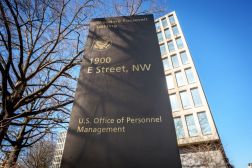How leaders can make every day a day of service
Some two decades ago, I was honored to work with Rep. John Lewis, D-Ga., and Sen. Harris Wofford, D-Pa., and the King family to transform the national holiday in honor of Dr. Martin Luther King Jr. into a “day on, not a day off … a day of action not apathy … a Day of Service not shopping and sales.” Last month’s celebration of the King’s National Day of Service was a reminder of how each of us can answer King’s challenge, who once said, “Life’s most persistent and urgent question is: ‘What are you doing for others?'”
The question however goes beyond one day where we all band together to serve our communities. True service is a mindset and a personal and professional and even institutional commitment that extends beyond one day a year.
But it also takes more than individuals: It requires leadership from public and private sector organizations that have the power to amplify what individuals can do to effect change.

Marty Rodgers
My former employer, Marian Wright Edelman is fond of saying, “Service is the rent we pay for living. It is the very purpose of life, and not something you do in your spare time.”
So, how can large organizations, including government organizations, contribute to the call to action King issued more than 40 years ago? More specifically, how can leaders influence the organization to more fully support diversity and inclusion?
Today’s successful leaders are creating positive, sustainable changes within their organizations by focusing on a few critical factors that lead to radical change:
Individuals
Nationally and globally, there is a need for skills that open doors to employment and economic opportunity. One of the biggest challenges to equality across many communities is education and skills development. Our ability to be competitive and relevant in the global economy, to fight poverty, to preserve the American dream and to realize King’s dream – depends upon it.
The federal government is facing an impending wave of “brain drain,” as many senior employees near retirement age. Combined with the rapidly changing nature of technology in the federal space today we, as leaders, must develop talent at every opportunity. We must personally engage in recruiting, coaching, mentoring and retaining our next generation of leaders.
At the same time, we must recognize when it is time to encourage individuals to take the skills and resources they have developed within the federal government to other sectors, while also welcoming those from other sectors to add to the federal talent mix.
We must also inspire our colleagues to foster inclusion and diversity across all sectors (government, nonprofit, and for-profit).
Community
Large organizations have the ability to amplify the actions of individuals. Part of our role as leaders is to instill in our young talent the importance of paying it forward. We need to develop leaders with aspiration, who breathe life into others and the community as they rise, versus leaders of ambition, who take breath away from others and rise at the expense of others and the community.
Our government is created for the people, and those who work daily supporting the various ongoing federal missions are unique in their dedication to a life of service. Service is fundamental to what we as leaders do – whether community service, client/customer service or public service. We must honor, encourage and reward the call to service in all its forms: military service, public service, national and community service, and client/customer service. And we must assert that leadership and service are indistinguishable.
As leaders we can not only encourage service to the community, but we can work within the organization to maximize the impact of personal contributions by providing channels through which to offer time, services, financial assistance or a combination of these.
We must also be willing to roll up our sleeves and work across boundaries. Whether working to help veterans prepare for jobs outside of the military, assisting in disaster relief efforts or mentoring a child in the local community, the power of the collective is an incredible force of good.
Organizationwide
To fully embrace the call to service, there may be need for organizational change. In the face of increased demand for results and decreased funding, it takes strong leadership to steer the organization on a changed course.
Successful leaders are rising above the noise and looking at their organizations with a strategic eye. Analyzing trends and looking beyond the current realities, these leaders are setting the direction for change and holding themselves accountable for the same.
An essential element of the process is to visualize, solidify and verbalize a compelling story that focuses the vision of change and communicates it well to others within the organization. This story should communicate a strong vision and goals in a simple and effective way. To best communicate this story, leaders need to be flexible and expect resistance to proposed changes.
Federal agencies hold a unique ability to affect this country and the lives of those who live here. When asked, I often say I came to Washington to work for my heroes and “sheroes” and was honored to work with many people who have dedicated their lives to social justice and the idea that people – especially young people – can change the world.
Residing here in the nation’s capital, I have been privileged to witness the immense impact that our federal government has on the daily lives of the people. All of this is made possible through strong leadership and service.
For me, King’s dream continues to inspire and challenge us. He once said (paraphrasing Theodore Parker), “the arc of the moral universe is long, but it bends toward justice.” So, in small and big ways, we together – business, government, nonprofit; people of all races, colors, creeds, and backgrounds; young and old; rich and poor – must work to “bend the arc” and make a positive collective impact on our future as a nation.
Marty Rodgers is director of Accenture Federal Services and location office managing director for metropolitan D.C.






